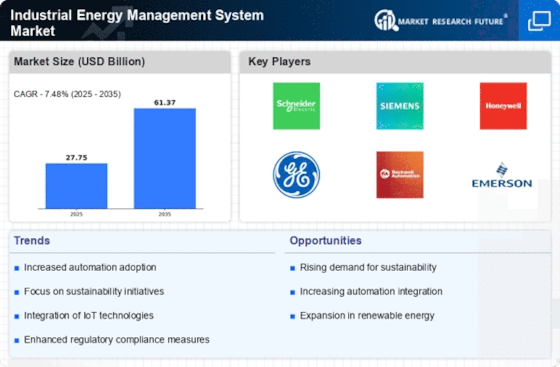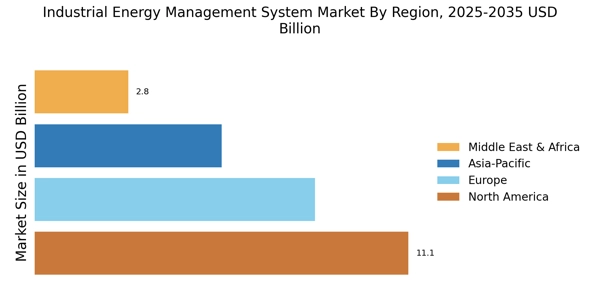North America : Innovation and Sustainability Leader
North America is the largest market for Industrial Energy Management Systems (IEMS), holding approximately 40% of the global market share. The region's growth is driven by stringent regulations aimed at reducing carbon emissions and increasing energy efficiency. The demand for smart technologies and automation in industries such as manufacturing and oil & gas further propels market expansion. Additionally, government incentives for renewable energy adoption are significant catalysts for growth. The United States is the leading country in this market, followed by Canada. Major players like Honeywell, General Electric, and Rockwell Automation dominate the landscape, leveraging advanced technologies to enhance energy management. The competitive environment is characterized by continuous innovation and strategic partnerships among key players, ensuring a robust market presence and driving further advancements in energy management solutions.
Europe : Regulatory Framework and Innovation
Europe Industrial Energy Management Systems Market is the second largest one, accounting for approximately 30% of the global market share. The region's growth is significantly influenced by the European Union's stringent regulations on energy efficiency and sustainability. Initiatives such as the European Green Deal aim to reduce greenhouse gas emissions, driving demand for advanced energy management solutions across various sectors, including manufacturing and transportation. Leading countries in this market include Germany, France, and the United Kingdom, where companies like Siemens and Schneider Electric are at the forefront. The competitive landscape is marked by a strong emphasis on innovation and sustainability, with many firms investing in research and development to enhance their offerings. The presence of key players ensures a dynamic market, fostering collaboration and technological advancements in energy management systems.
Asia-Pacific : Emerging Market with High Potential
Asia-Pacific is witnessing rapid growth in the Industrial Energy Management Systems Market, holding approximately 20% of the global market share. The region's expansion is driven by increasing industrialization, urbanization, and a growing focus on energy efficiency. Governments are implementing supportive policies and incentives to promote the adoption of energy management systems, particularly in countries like China and India, where energy demand is surging. China is the largest market in the region, followed by India and Japan. The competitive landscape features key players such as Mitsubishi Electric and ABB, who are actively investing in local partnerships and technological advancements. The presence of these major companies, along with a growing number of startups, is fostering innovation and enhancing the overall market dynamics in the Asia-Pacific region, making it a key area for future growth.
Middle East and Africa : Resource-Rich and Growing Demand
The Middle East and Africa regions are gradually emerging in the Industrial Energy Management Systems Market, holding about 10% of the global market share. The growth is primarily driven by increasing energy consumption and the need for efficient energy management solutions in industries such as oil and gas, manufacturing, and utilities. Governments are recognizing the importance of energy efficiency and are implementing regulations to promote sustainable practices, which is expected to further boost market growth. Leading countries in this region include South Africa, Saudi Arabia, and the UAE, where there is a growing presence of key players like Siemens and Honeywell. The competitive landscape is evolving, with both established companies and new entrants focusing on innovative solutions tailored to local needs. This dynamic environment is fostering collaboration and investment in energy management technologies, positioning the region for significant growth in the coming years.

















